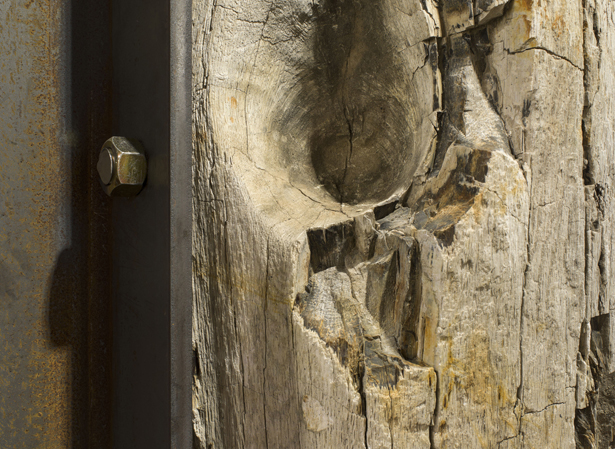Carol Bove
Carlo Scarpa
1 November 2014–1 March 2015
Opening: Friday 31 October, 7pm
MUSEION of modern and contemporary art Bolzano
Via Dante 6
39100 Bolzano
Italy
Carol Bove / Carlo Scarpa brings together works by American artist Carol Bove (b. 1971) spanning 2003 to 2014 with vitrines, easels, sculptures and architectural prototypes by Venetian architect and exhibition designer Carlo Scarpa (1906–78). Curated by the Henry Moore Institute (Leeds, UK), a centre for the study of sculpture, Carol Bove / Carlo Scarpa spans three international venues. The exhibition opens at Museion (Bolzano, Italy) in November, travelling to the Henry Moore Institute and Museum Dhondt-Dhaenens (Deurle, Belgium) in 2015.
Of different generations, training and disciplines, Bove and Scarpa are bound by concerns for the object and its environment, and the encounter with sculpture. For both, the ways objects are given meaning is of fundamental concern. Carol Bove / Carlo Scarpa features rarely seen exhibition furniture by Scarpa designed for the Italian museums Museo di Castelvecchio (Verona) and Gipsoteca Canoviana (Possagno). Divorced from their intended surroundings, his vitrines and easels are seen in this exhibition empty—save for one. The exception is a showcase filled with the architect’s prototypes for the Brion Tomb, a monumental burial structure in San Vito d’Altivole, Treviso. Surrounded by gardens, a meditation pavilion and chapel, this is considered Scarpa’s architectural masterpiece.
Scarpa’s approach to exhibition design demonstrates a highly personal and formal vocabulary to display, as do Bove’s sculptures. She elevates shells, driftwood and coral on plinths and steel armatures in a reduced language of museological display. The works force pieces of flotsam into becoming sculptures, questioning the boundary between detritus and artwork. One of Bove’s early shelf sculptures from 2003 sits as a counterpoint to the Brion Tomb tests which experiment with architectural details, each bearing Scarpa’s signature forms, such as the chevron and ziggurat. In this work, Conversations with Jorge Luis Borges (2003), Bove uses a modernist shelving system to hold vintage paperbacks, a metronome and string object—tokens of her research interests.
At the centre of the exhibition is a new setting by Bove for a rare moment when Scarpa created his own sculptures for the 1968 Venice Biennale. The sculptures are made of precious stones, metal and bronze, and were exhibited within a bespoke display set against freestanding textile panels titled Ambiente [Environment]. In Carol Bove / Carlo Scarpa photographs by Luciano Svegliado show this historical exhibition, while Bove reimagines the display, placing Scarpa’s sculptures alongside her own on a large platform with Bove choosing a support for each of Scarpa’s objects. Towering above the grouping is Cretaceous (2014), a monumental new work by Bove consisting of an upright steel I-beam holding an ancient piece of petrified wood. This commission underlines Bove’s consistent blurring of the boundaries between sculpture and specimen, artwork and exhibition furniture. In this unique pairing of an architect and artist, Carol Bove / Carlo Scarpa investigates how the display of objects and artworks creates meaning.
A quadrilingual catalogue (English/German/Italian/Dutch) with essays by Philippe Duboy, Dr Andrea Phillips and Pavel S. Pyś, edited by Lisa Le Feuvre, will be published on the occasion of the exhibition.
Events:
5 February 2015
Guided tour in English and Italian by Pavel Pyś (Exhibitions & Displays Curator, Henry Moore Institute) and Alba Di Lieto (curator of Archivio Carlo Scarpa, Museo di Castelvecchio, Verona Museo di Castelvecchio)
The Graham Foundation for Advanced Studies in the Fine Arts has supported the Henry Moore Institute iteration of Carol Bove / Carlo Scarpa.


